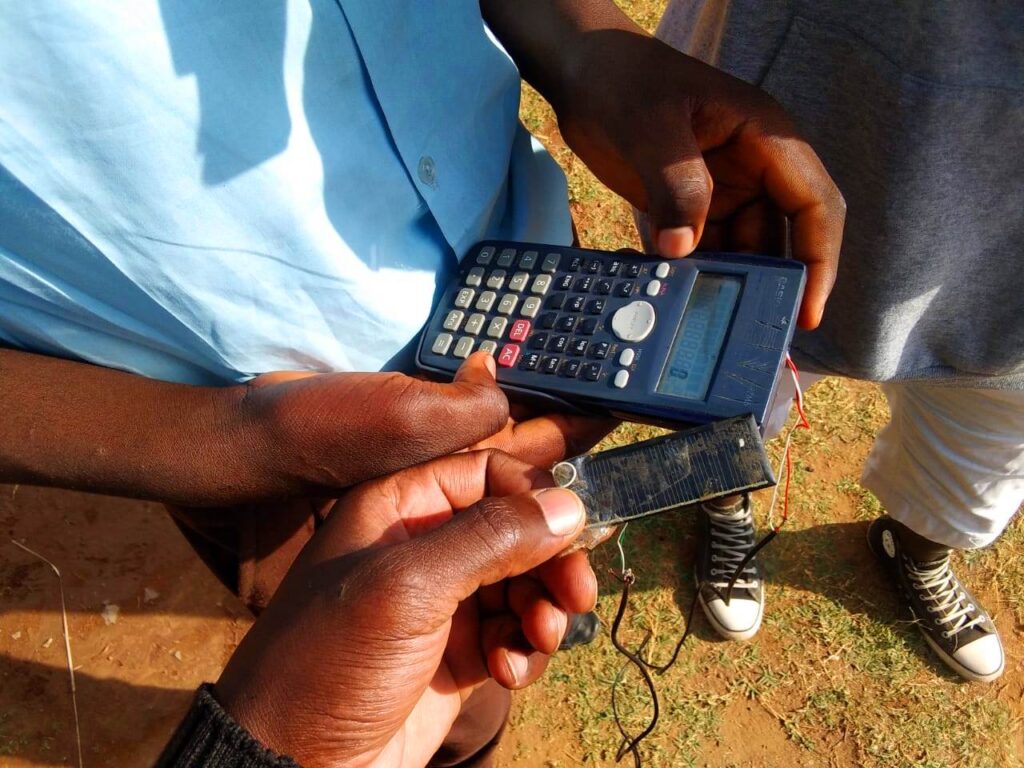As far back as Standard Six, Samuel Ndalegwa’s insatiable appetite for electronics had already taken root.
This passion has years later made him the talk of his little known hilly village of Emanda, Vihiga County.
Born of a single mother in a family of four, Ndalegwa being the last born, it was apparent judging from their humble home that he was not born with a silver spoon.
Indigenous trees and shrubs characterized by a never ending footpath that meander between gigantic rocks weave the terrain that first ascend then descends to their home which is roughly half a kilometer from school.
With electricity being nothing but a dream for most in the hillside village that is largely accessible on foot, residents utilize candles, paraffin lamps and lately solar panels for illumination during the night.
It is this obvious necessity that birthed the inventive drive in the 18 year old Form Two student of Emanda Secondary School.

Calculator batteries
Intrigued further by the ‘magic’ of the functionality of the solar panels, the physics student, frustrated by the flakiness of the batteries used in the student calculators, endeavored to put his ingenuity to work, a step that has since earned him the name ‘inventor’ among some of his peers.
“I saw that the batteries used in the calculator were wearing fast and hence not reliable given the robustness of the activities undertaken by the gadget which is usually shared among some of my mates,” the slim dark gentleman said with a smile, adding that they were additionally expensive, the long tiresome walks to the shops notwithstanding.
These sentiments were further cemented when his physics teacher Mr Mwenya Elphas, implored his students to be creative and develop inventive and innovative minds.
“I always tell my students to be creative and come up with problem solving innovations,” he said, terming Ndalegwa as very inquisitive and persistent when it comes to class work.
According to his mother Beatrice Kamonyo, the teen scholar is a kind-hearted boy who always minds his own business while at home.
She added: “I rarely have issues with him as he is obedient and never minds helping out with house chores.”
The boy who also opened up in a rather emotional narration that gave us a rare glimpse into his life, revealing that sometime back he had had to work at a local brick building site in order to get his first solar panel, mentioned that his life’s dream is to become an electrical engineer.

“I got my first solar panel by helping out a local brick maker at his site and my dues came in the form of a small hand-sized solar panel. It is what I wanted because I was curious to explore with it and to feed my dream of one day becoming a guru in the electrical world,” Ndalegwa said.
He wasn’t 18 yet.
The young man’s bond with everything and anything wired is one that is more familiar to his schoolmates than his mother who at first never thought much about his strange collections.
Always wondering what the young fellow was up to.
‘Demented’ collector
Branded as ‘crazy’ by some of his mates for scavenging broken and discarded gadgets and tiny metal scraps and wires, Ndalegwa sailed above all the parody that were occasionally hurled his way to become his school’s trophy boy.
The salvaged materials, his tools of trade, usually find a home in his desk in the classroom or back at home and surface on occasions he feeds his electrical enthusiasm.
Brian Liviri who is both a classmate and a friend to the aspiring engineer said: “His desk is always full of wires and other paraphernalia which only he comprehends.”
Liviri who also mentioned that Samuel is like a brother to him, indicated that the young inventor has a habit of missing in action whenever they converge for fun, sporting or any social activity as students.
“We have gotten used to the fact that he is never present on a full time basis to participate in the joint activities,” the dark jovial gentleman said, adding that Ndalegwa’s frequent escapes are usually traced to an obvious end which is indulgence with his ‘toys’.
He further added: “Some of the students may have thought of him as unhinged because of all the scavenging he does with absolutely no regard to who’s watching or judging, but I know my friend and I have grown to accept that this is his passion.”
The inventor
Dismantling gadgets and attempting to reverse engineer them or just to have a look at their mechanical complexity and the technicality of their creation is a fantastic pass time of the physics student.
It is perhaps how the young mind stumbled upon the ingenious idea of integrating his scientific calculator with the solar panel, utilizing his knowledge from the classroom.
His physics teacher, who explicated the details of the invention, said: “When the sun rays strike the solar panel which is made of photovoltaic cells, an electric field is created and a conductive wire at the edge of the panel carries the direct current (DC) produced into the appliance.”
The photovoltaic cells which Ndalegwa says are the key ingredients that convert the sun’s rays into electricity are made of mostly silicon which is a semi-conductive material which apart from conducting electricity also creates an electric field by maintaining the electrical imbalance required.
While an inverter is needed to convert DC to alternating current (AC), a rectifier, built from electronic components called diodes, is required to change AC to DC.
Ndalegwa’s invention utilizes DC from the solar panel to power the calculator.
Using a wire about a meter long, the form two student interconnected the solar panel with his calculator and literally kissed batteries goodbye.

With his desk close to the window, the elongated wire, he says, allows for the small panel to hang out for better capture of sunlight.
With the earth receiving about 173, 000 terawatts of solar energy at any given time, it can be said that such inventions, however insignificant in proportion, will have greater positive impact going forward.
From a large scale perspective, and with good will and resources, the boy’s ingenious invention could potentially provide a solution to many other students faced with similar challenges.
considering the fact that the calculator can only be used during the day, a rechargeable inbuilt battery within the calculator would make the invention complete, allowing the energy absorbed during the day to be utilized at night.
Kamonyo who applauded her son’s invention, said he is a hard working boy who can make it far education-wise if given support.
“If he is supported in his dream of taking up electric engineering at the university level, then I know he will not disappoint,” said the 53 year old widow who farms for a living.
She is clearly proud of her son.
His friend Liviri, who has used the calculator on several occasions, said it works well and has been of great assistance to many in their class.
